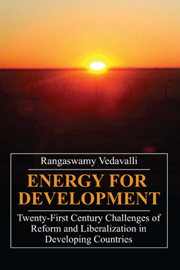 Energy for Development
Energy for Development Book contents
- Frontmatter
- Contents
- Abbreviations
- List of Tables
- List of Boxes
- Preface
- 1 The challenge of increasing access to energy for development
- 2 Changing global energy industry: implications for developing countries
- 3 Energy financing in developing countries in the pre-and post-1990s: towards energy sector reform and liberalization
- 4 Whither energy sector reform and liberalization in developing countries? A reality check
- 5 Energy sector reform and liberalization: case studies
- 6 Energy sector reform and liberalization and energy for the poor
- 7 Energy sector liberalization in developing countries: lessons and twenty-first century challenges
- 8 The way forward
- Bibliography
- Index
3 - Energy financing in developing countries in the pre-and post-1990s: towards energy sector reform and liberalization
Published online by Cambridge University Press: 05 March 2012
- Frontmatter
- Contents
- Abbreviations
- List of Tables
- List of Boxes
- Preface
- 1 The challenge of increasing access to energy for development
- 2 Changing global energy industry: implications for developing countries
- 3 Energy financing in developing countries in the pre-and post-1990s: towards energy sector reform and liberalization
- 4 Whither energy sector reform and liberalization in developing countries? A reality check
- 5 Energy sector reform and liberalization: case studies
- 6 Energy sector reform and liberalization and energy for the poor
- 7 Energy sector liberalization in developing countries: lessons and twenty-first century challenges
- 8 The way forward
- Bibliography
- Index
Summary
Oil price increases of the 1970s, the debt problems of the 1980s, the globalization wave of the 1990s and the associated changing global energy industry have had profound effects on reforming and financing investment in the energy sector in developing countries.
This chapter examines the changing patterns of financing energy in developing countries in the pre and post 1990s. The chapter discusses the steps developing countries were required to take to reform and liberalize their energy sectors to integrate with 1990s globalization and attract finance for energy for development.
Energy financing in the pre-1990s period
In the pre-1990s period governments traditionally intervened heavily in the energy sector often through ownership of energy companies. During the 1960s and the early 1970s, external capital financed only a small share of total energy investment in developing oil importing countries. As a result the government budget and government sponsored borrowing were often the main sources of financing for energy investment, especially for coal, natural gas and electricity projects. With rising oil prices in the 1970s, two major shifts in international capital impacting financing energy have occurred. First is the shift from equity to debt and the second is from official to private finance.
Rising debt burden
The growth of borrowing since 1973 produced a corresponding rise in external debt. Between 1970 and 1984 the outstanding medium and long-term debt of developing countries as recorded in the WB Debtor Reporting System (DRS) increased from US $68 billion to US $686 billion, an average increase of 16.7 per cent a year.
- Type
- Chapter
- Information
- Energy for DevelopmentTwenty-first Century Challenges of Reform and Liberalization in Developing Countries, pp. 41 - 76Publisher: Anthem PressPrint publication year: 2007


